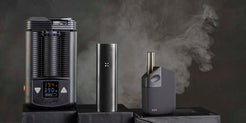Why we tested
Everything we carry at Planet of the Vapes is fully tested before it’s approved for our catalog, and a lot of products don’t make the cut. The Saionara atomizer is one of the better performing extract products we’ve tested, but we needed to confirm the metals used in the coils were as advertised.
We took samples of all the metals from production coils and had them lab tested by Element Materials Technology. We’re happy to report that all the metals passed.
We'd love to share the results with you, and are currently ensuring we have the appropriate approval to do so.
Note: Planet of the Vapes doesn't make any claims about the safety or health effects of these materials. These tests show that the coils are made from the materials that Saionara claims they are, or a reasonable substitute.
Related: Which Saionara Atomizer is Right for you?
Sample 1 - Titanium wires from Triple Ti coils
These wires came back as Titanium Grade 1, except they were just above the limit for carbon. We spoke to the technicians, who reported the carbon is a little high but it probably doesn’t mean it’s not Grade 1. The reading could have been due to contamination from shipping, or when we handled them while pulling them from coils. These technicians also did offgas testing on some Grade 4 titanium, and in their opinion these wires are fine for our application. (full report - PDF)
Sample 2 -Titanium Bucket from Bucket coil
This came back as Titanium Grade 4. Any titanium grade 1 through 4 will do for the bucket. Grade 4 isn’t good for wires since it’s brittle and can break, but is fine in this configuration. (full report - PDF)
Sample 3 - Stainless Steel wires from stainless steel coils
This came back as Stainless Steel 316 - exactly what we wanted. Nothing to see here. (full report - PDF)
Sample 4 - Kanthal from kanthal wires
Kanthal is a popular metal for coils for its performance and durability, but it has aluminum in it, so some people like to stay away from that one. However, this sample came back as Stainless Steel 446, which is the same as Kanthal, but without the aluminum. Instead, it has trace amounts of Manganese, Silicon, Nickel, Carbon, Phosphorus and Sulfur. This may be a better choice than true Kanthal, so we were pleasantly surprised with this result. (full report - PDF)
Sample 5 - Clapton from clapton wires
Clapton describes the wrap style, not the metal, so technically anything can be used for it. Clapton just refers to the guitar-style wire, which is wrapped around another wire. This sample came back Nimonic 75, which the industry commonly calls NiChr 80 since it's an 80/20 nickel/chromium alloy. (full report - PDF)
Sample 6 - lead wires from all coils
We also sent in all the lead wires to find out what they were made of, and they came back as Ni 200, or 99.6% pure nickel. This is a common wire used for leads in coils and dry herb vaporizers. (full report - PDF)



